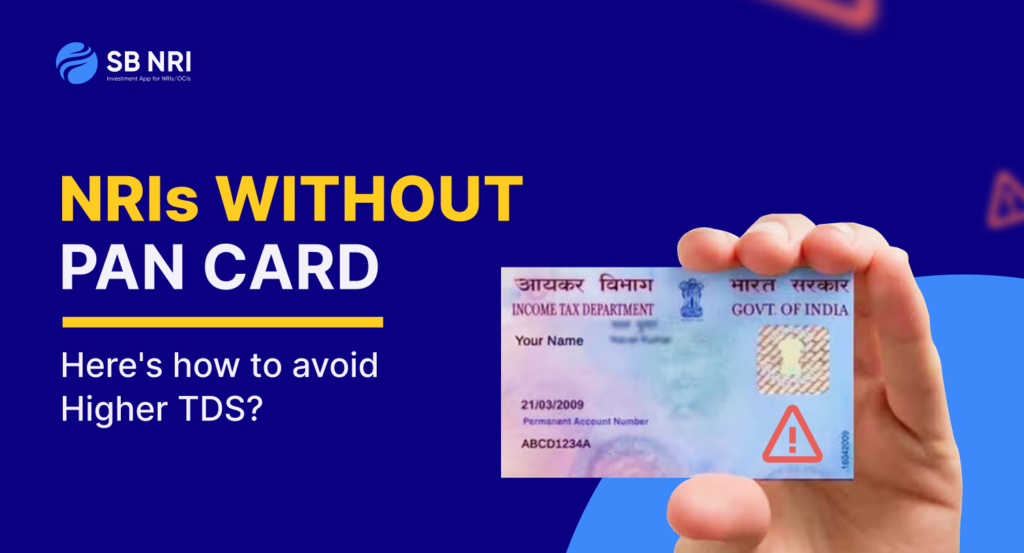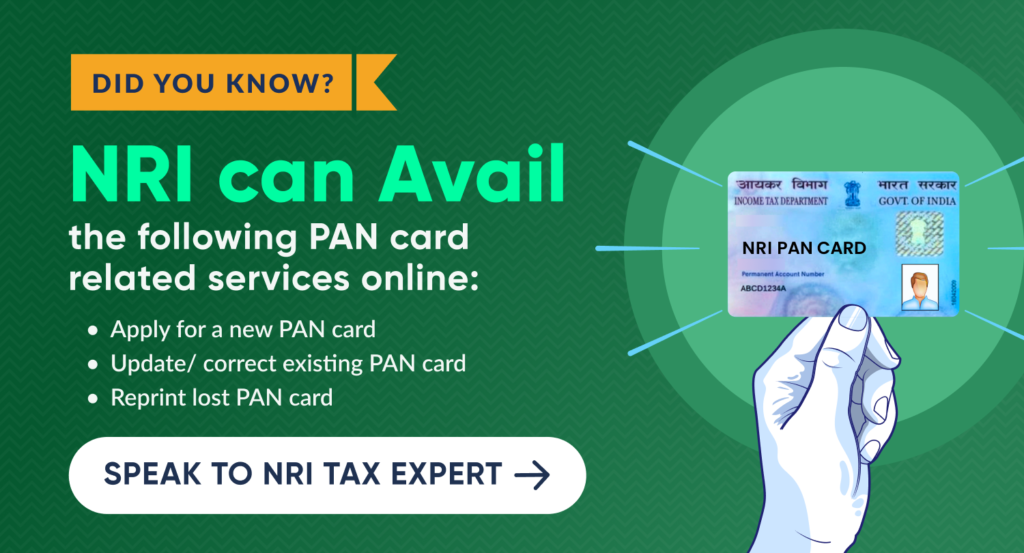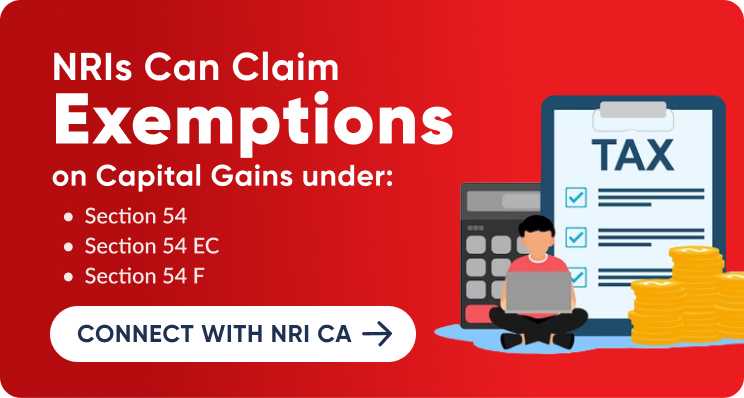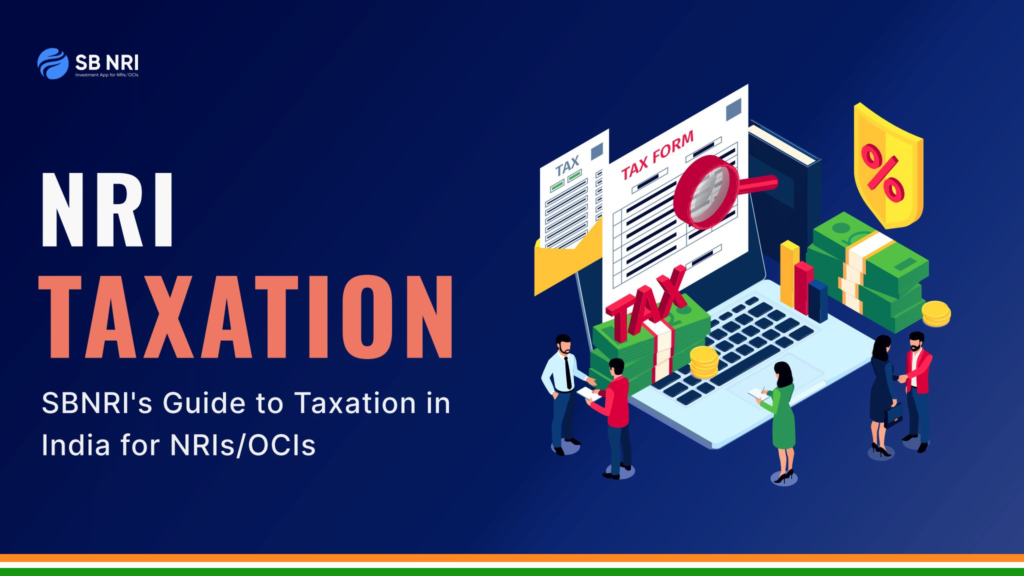
When it comes to tax liability and rules, being a Non-Resident Indian(NRI) presents a different scenario to a resident Indian. The primary reason is, that for NRIs, only their income arised or earned in India is taxable while for resident Indians, all incomes are taxable. Furthermore, NRIs receive their income after the TDS deduction so the likelihood of getting capped at higher TDS is much more frequent. An NRI also needs to hold a PAN card otherwise they have to pay more TDS. In this blog, we’ll look into the case where NRI without PAN Card can avoid higher TDS.
Which incomes are taxed in India for NRIs?
Given below is a detailed account of taxable income for NRIs in India:
- Salary
- In case an NRI receives a salary in India, it becomes taxable in India. Hence, if an NRI earns a salary for services rendered in India, such income is subject to taxation.
- House Property and Loans
- Income derived from a vacant or rented house property in India is taxable as per the current rates.
- The income tax regulations mandate that any capital gains arising from the lease, sale, or rent of a property in India are taxable.
- An NRI, like any other Indian resident, can claim a deduction of up to 30% on their home loan in India. Furthermore, an NRI can also claim deductions for principal repayment, registration fees, and stamp duty under Section 80C.
- If a tenant pays rent to an NRI property owner, a TDS at a rate of 30% must be deducted before transferring the funds to the NRI’s account. The person making the payment to the NRI must file Form 15CA/15CB online with the Income Tax Department.
- Capital Gains
- In India, capital gains arising from long or short-term securities are subject to taxation.
- Capital gains on shares held in India are also taxable.
- The transfer of an asset in India resulting in capital gains is also subject to taxation.
- Investments
- NRIs who invest in assets in India are taxed at a rate of 20%. If TDS has been deducted on the invested income, they are not required to file returns. Additionally, certain investment assets in India qualify for special treatment, which are listed below:
- Central government securities
- Shares in Indian companies
- Deposits
- Debentures (for publicly listed companies)
- NRIs who invest in assets in India are taxed at a rate of 20%. If TDS has been deducted on the invested income, they are not required to file returns. Additionally, certain investment assets in India qualify for special treatment, which are listed below:
- Other Sources
- Income sourced from India, such as interest earned on fixed deposits and savings accounts, is subject to taxation in India. Interest received on NRO (Non-Resident Ordinary) accounts is fully taxable, while interest received on NRE (Non-Resident External) and FCNR (Foreign Currency Non-Resident) accounts is exempt from tax.
Also read: TDS on Sale of Property by NRI in India [New Rates for 2024]

Importance of PAN card for NRIs
A PAN card is a 10-digit number with alphabets and numbers given by the Income Tax Department to all Taxpayers. Having a PAN card makes banking, investing, and buying and selling real estate in India easier for NRIs/OCIs. It is mandatory if an NRI wants to conduct the following activities:
- To Open a Bank account in India [NRE, NRO & FCNR (B)]
- Earns Taxable income in India
- Invests in Mutual Funds
- Sells and Purchases property in India
- Identity Proof
- For claiming the inheritance gift as NRI from parents
- To buy physical gold worth more than Rs. 2 lacs
Also read: PAN Card for NRI: The Ultimate Guide 2024
Higher TDS Rates for NRIs Without PAN
The absence of a PAN card can result in higher TDS rates on income earned in India. As per the Income Tax Act, if an NRI doesn’t furnish their PAN to the deductor, the TDS rate will be the higher of either:
- The rate prescribed in the relevant provision of the Income Tax Act.
- The rate in force, i.e., the highest rate applicable under the Income Tax Act.
Higher TDS rates can lead to unnecessary tax deductions, impacting the NRI’s cash flow and overall tax liability.
Also read: PAN Card for NRI without Aadhaar Card – A Complete Guide
How NRIs can avoid paying higher TDS by opening NRI accounts
- Non-resident customers can open NRI accounts, including Non-Resident External (NRE) Account, Foreign Currency Non-Resident (FCNR) Account, and Non-Resident Ordinary (NRO) account, to avoid paying high TDS in India.
- Funds in NRE and FCNR accounts are fully exempted from tax in India. Hence, NRIs who hold these accounts will not be liable to pay TDS in India.
- Interest earned on funds in an NRO account is however taxable with the TDS at the rate of about 30%.

Invest in NRI mutual funds in India to avoid higher TDS
Mutual fund investment is one of the effective ways for NRIs to save on TDS payments. NRIs need to open an NRE/ NRO account to invest in mutual funds. Investing in mutual funds provides NRIs with several benefits:
- NRIs will be able to save a higher TDS than they would otherwise have paid.
- Large sums of investment in mutual funds in India may be significantly exempted from TDS or NRIs may have to pay it at a rate which is much reduced.
Also read: NRI PAN Card Duplicate, How to Apply for Lost or Damaged PAN Card
Calculate your TDS Refund with SBNRI’s TDS Refund Calculator
A TDS refund is the process of reclaiming the excess tax deducted at source by the payer if the actual tax liability of the taxpayer is lower than the TDS deducted. This situation typically arises when the income tax calculated on the total income is less than the TDS already deducted. To claim a TDS refund, taxpayers need to file an income tax return (ITR). The Income Tax Department processes the ITR and verifies the details. If the tax department finds that the TDS paid is more than the actual tax liability, the excess amount is refunded to the taxpayer.
You can easily find out how much tax refund you can get by calculating your TDS Refund from this TDS Refund Calculator.
Access SBNRI’s Exclusive NRI Taxation Guide

NRIs and OCIs can now access SBNRI’s exclusive NRI Taxation Guide covering in-depth information about DTAA, Gift Tax, Rental Income Tax, ITR Filing, Types of ITR Forms for NRIs, Capital Gain Tax, Income Tax, and more. The report will help you understand India taxation on mutual funds, other asset classes and how you can comply with the regulations.
Access NRI Taxation report here
Wrapping Up
While not having a PAN card as an NRI can lead to higher TDS deductions, there are several strategies to mitigate its impact. Whether through applying for a PAN card, submitting Form 15G/15H, availing DTAA benefits, or obtaining a Lower TDS Certificate, NRIs have options to ensure tax efficiency and compliance. It’s essential to assess individual circumstances and consult with tax professionals for personalized guidance on managing Indian income tax obligations effectively.
Contact SBNRI
Due to a complicated tax system and recurrent amendments, understanding tax laws can be confusing and NRIs may be subject to additional fees or miss claiming deductions and other benefits. At SBNRI, we understand this struggle. You can download SBNRI App to connect with our NRI Tax Experts to know more about new TDS/ TCS rules for NRIs. You will also get end-to-end assistance related to NRI tax filing.
SBNRI will also help you get a lower TDS Certificate. You can also click on the button below to ask any questions. Visit our blog and YouTube Channel for more details.
FAQS
What is an NRI PAN card?
- It is a legal requirement for NRI to conduct Financial transactions in India. Required by the Income Tax Department, it acts as a unique identifier. An NRI PAN Card is necessary for non-resident Indians (NRIs) to comply with income tax laws in India, whether they are making money through:
- Investments
- Salaries
- Property Rents
- Dividend Income
Can an NRI buy property in India without a PAN card?
NRIs need a PAN card because they will be required to file income tax returns if they have rented out the property. Besides, if the property is sold later, the capital gains resulting from the sales would be subject to capital gains tax. Capital gains would be included in the total income while it is being taxed.
Do NRIs need a PAN card to invest in mutual funds?
Yes. NRI can invest in mutual funds in India using their NRE/NRO bank account once they complete their Mutual Fund KYC.
What is the TDS on the NRI property?
TDS (Tax Deducted at Source) shall be deducted whenever any property is sold/ purchased. The buyer needs to deduct TDS and pay the balance to the seller. The amount to be deducted depends on the residential status of the seller. In the case of an NRI seller, the amount of TDS to be deducted will depend on the quantum of money received by the seller.
Do NRIs pay capital gains tax?
Yes, capital gains tax provisions for an NRI are similar to those for a resident individual except for the applicability of TDS provisions. Like resident investors, capital gains tax for an NRI depends on the holding period and the type of property sold.
Is PAN card different for NRI?
A PAN is mandatory when filing Income-Tax return, TDS or any transaction that attracts tax. PAN works completely the same way for both NRI and Resident Indian except for one factor – the type of Application Form alone changes concerning your current Residential Status.
Can I apply for PAN card from the USA?
Yes. You can apply for a PAN Card from the USA. The easiest and most convenient way to apply for a PAN card from the USA is online. Watch the video to know about the process in detail.
Is a PAN card mandatory for an NRI bank account?
An NRI needs a PAN Card if that NRI has got a taxable income in India. According to the new rule of SEBI, any NRI not having PAN Card cannot do the share trading by depository or broker. PAN Card is also mandatory for an NRI if the NRI would like to invest in Mutual Funds.
Can OCI holders get PAN card?
People who hold Indian citizenship and settled abroad should use the Form 49A available for Indian citizens. Whereas NRIs who hold foreign citizenship, such as OCI holders or people of Indian origin who possess foreign citizenship or foreigners who are not of Indian origin are required to fill Form 49AA.
Can an NRI buy property in India without PAN card?
- NRIs need a PAN card because they will be required to file income tax returns if they have rented out the property. Besides, if the property is sold later, the capital gains resulting from the sales would be subject to capital gains tax. Capital gains would be included in the total income while it is being taxed.
How can NRIs avoid paying TDS on property sale?
If an NRI is selling property in India, the buyer is required to deduct TDS at the rate of 20% in case of long-term capital gains. However, if the property is sold before two years, TDS shall be deducted at the rate of 30% as a short-term capital gains tax.
What is the TDS rate on sale of property by NRI?
- Long-term capital gains on the sale of property held for more than 2 years: 20%
- Short-term capital gains on the sale of property held for less than 2 years: As per the income tax slab rates of the seller
Do NRIs pay capital gains tax?
Yes, capital gains tax provisions for an NRI are similar to those for a resident individual except for the applicability of TDS provisions. Like resident investors, capital gains tax for an NRI depends on the holding period and the type of property sold.



